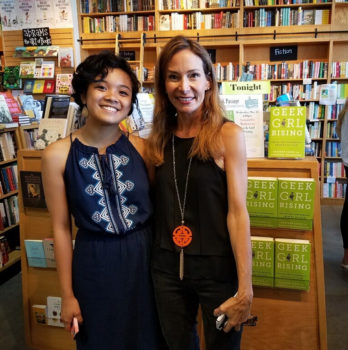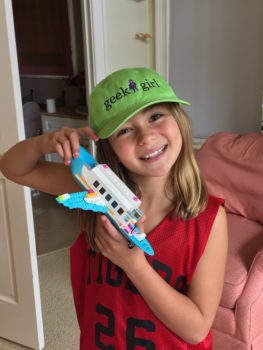
You would never have guessed that Silicon Valley is a land of “brogrammers” and “boy geniuses” last night at Book Passage in San Francisco. Four pioneering women in tech– Samara Trilling, a software engineer at Google, Teresa Ibarra, 2nd-year computer science student at Harvey Mudd College and software intern at StitchFix, Aparna Pujar, Founder and CEO of Enfavr, and Maci Peterson, Co-founder and CEO or OnSecondThought— joined Geek Girl Rising co-author Samantha Walravens to discuss strategies for succeeding as a woman in tech and ways to inspire the next generation of women and girls to join the digital revolution.
Samara Trilling, who entered Columbia University as a Political Science major and graduated with a Computer Science degree, said that young women discount computer science and engineering as a potential field of study because they think it’s too hard or that they won’t like it.
“People (often girls) think that if they don’t get something immediately, computer science is not for them, and they’re not cut out for it,” Trilling explained. “This is the biggest misconception in the tech world. I loved the recent post by Amy Nguyen called “I need more terrible female engineers.” The only question you should have to ask yourself when deciding if you belong in CS is, “Do I like it?” If you really do, then you belong here.”

Teresa Ibarra explains the importance of having people “who look like you” in your network to serve as role models because, as the saying goes, “you can’t be what you can’t see.”
“It’s important for young women of color to see that tech is a career that’s possible for people that look like them,” Ibarra explains. “One of my biggest deterrents to learning how to program was that I thought programming was reserved for white men, and not for ‘people like me.’ I had never met another Filipina in tech until about two weeks ago. Not only was she also a Bay Area native, but also planned to start her own company as a technical founder. After seeing her go for it, I’ve decided to focus my time on preparing to become a founder.”
Aparna Pujar, who has worked in various executive roles at Yahoo! and eBay and has recently launched her own tech company, Enfavr, encouraged women to speak up and ask for what they want, be it a promotion at work or funding for their startup. She credits a few key mentors and sponsors in her career for believing in her and pulling her up to senior positions. She also credits her time at the Women’s Startup Lab (WSL), an accelerator program for female founders, with providing her a network of other entrepreneurs, mentors and investors who have helped her navigate the startup world.
“I found within my (WSL) cohort a group of friends whom I can trust,” said Pujar. “I can go to them when I’m struggling with a problem, which is so important because being a founder and CEO is a very lonely role. Having this group of friends who can guide you and help you navigate the issues is very, very helpful.”

Maci Peterson received a round of applause when she announced that she was the 14th black women to date to have raised over $1 million dollars in funding. “As a black woman founder, there aren’t that many investors who look like me,” she explained. “The ones who funded me were minority or women who get what I am doing.” Peterson is closing a $1.2 million seed round and is licensing her patented messaging delay/recall technology to wireless carriers and social media platforms the world over.
For more advice and stories from women on the front lines of the digital revolution, buy Geek Girl Rising: Inside the Sisterhood Shaking Up Tech today.

 Our children and their insatiable appetite for all things tech sparked some of the initial ideas for Geek Girl Rising. Heather has tween twins: a boy and girl. Sam has four children: two teenaged boys, a teen girl and another daughter in elementary school.
Our children and their insatiable appetite for all things tech sparked some of the initial ideas for Geek Girl Rising. Heather has tween twins: a boy and girl. Sam has four children: two teenaged boys, a teen girl and another daughter in elementary school. The search for new role models to inspire our girls and boys to think of themselves as the builders and inventors of the future drove us early on in our reporting process. We learned about the efforts inside public schools, by inventors and entrepreneurs and by non-profit organizations to smash stereotypes about coding and engineering and to ignite kids’ and especially, girls’ imaginations around their potential to be creators and problem solvers.
The search for new role models to inspire our girls and boys to think of themselves as the builders and inventors of the future drove us early on in our reporting process. We learned about the efforts inside public schools, by inventors and entrepreneurs and by non-profit organizations to smash stereotypes about coding and engineering and to ignite kids’ and especially, girls’ imaginations around their potential to be creators and problem solvers.